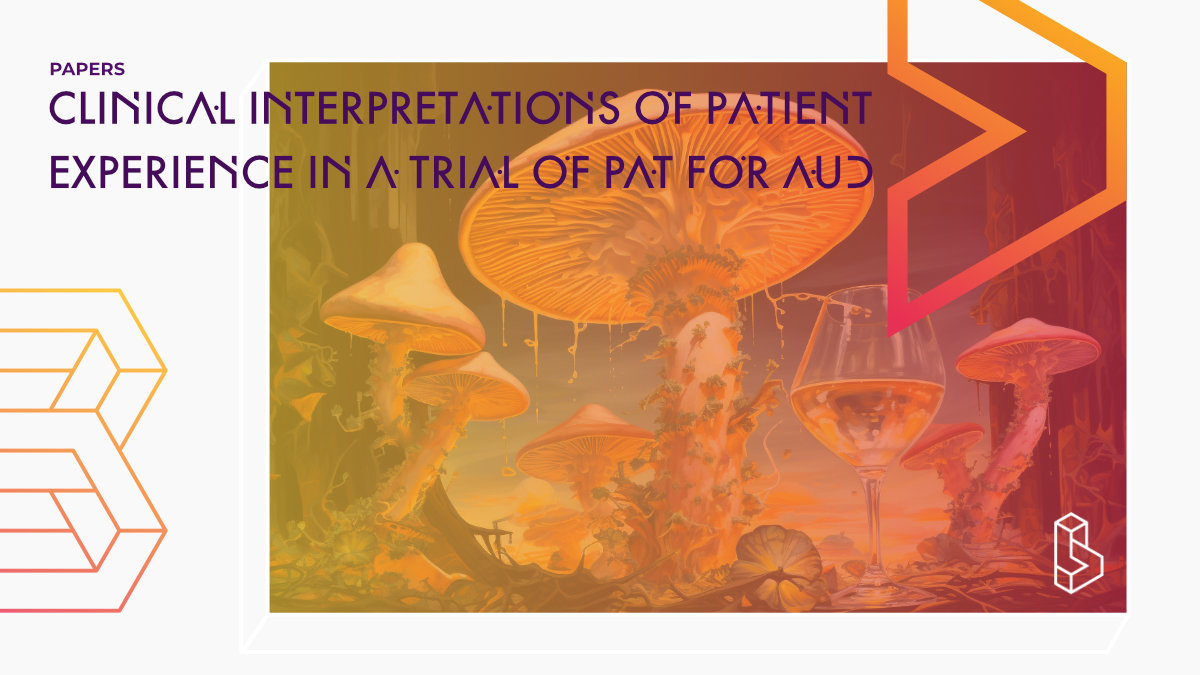This study describes the treatment trajectories of (n=3) participants administered with psilocybin (25-40mg/70kg) in a double-blind placebo-controlled clinical trial investigating the treatment of alcoholism (AUD). These participants experienced acute and lasting alterations in their perceptions of self, in the quality of their baseline consciousness, and in their relationship with alcohol. Increased mindfulness, and control over choices, were also reported following the treatment.
Abstract of Clinical interpretations of patient experience in a trial of PAT for AUD
“After a hiatus of some 40 years, clinical research has resumed on the use of classic hallucinogens to treat addiction. Following completion of a small open-label feasibility study, we are currently conducting a double-blind placebo-controlled clinical trial of psilocybin-assisted treatment of alcohol use disorder. Although treatment effects cannot be analyzed until the study is complete, descriptive case studies provide a useful window into the therapeutic process of psychedelic-assisted treatment of addiction. Here we describe treatment trajectories of three participants in the ongoing trial to illustrate the range of experiences and persisting effects of psilocybin treatment. Although it is difficult to generalize from a few cases, several qualitative conclusions can be drawn from the data presented here. Although participants often find it difficult to describe much of their psilocybin experience, pivotal moments tend to be individualized, extremely vivid, and memorable. Often, the qualitative content extends beyond the clinical problem that is being addressed. The participants discussed in this paper experienced acute and lasting alterations in their perceptions of self, in the quality of their baseline consciousness, and in their relationship with alcohol and drinking. In these cases, experiences of catharsis, forgiveness, self-compassion, and love were at least as salient as classic mystical content. Finally, feelings of increased “spaciousness” or mindfulness, and increased control over choices and behavior were reported following the drug administration sessions. Ultimately, psilocybin-assisted treatment appears to elicit experiences that are extremely variable, yet seem to meet the particular needs of the individual.”
Authors: Michael P. Bogenschutz, Samantha K. Podrebarac, Jessie H. Duane, Sean S. Amegadzie, Tara C. Malone, Lindsey T. Owens, Stephen Ross & Sarah E. Mennenga
Summary of Clinical interpretations of patient experience in a trial of PAT for AUD
The past decade has seen a renewed interest in the therapeutic potential of psychedelics in psychiatry. Psilocybin-assisted psychotherapy has shown promising results in treating alcohol use disorder, cigarette addiction, and depression in cancer patients.
Most clinicians and researchers exploring hallucinogens in clinical practice combine the administration of hallucinogens with psychotherapy, believing that therapeutic benefit derives from the subjective experiences occasioned by the drug, coupled with the successful integration of these experiences through psychotherapy.
The psychedelic therapy model held that peak-psychedelic experiences were crucial to therapeutic benefit. Still, the measures used in hallucinogen-assisted treatment trials do not adequately capture the range of psychological experiences and processes that participants reported as critical to positive changes in their drinking.
Find this paper
https://doi.org/10.3389/fphar.2018.00100
Open Access | Google Scholar | Backup | 🕊
Cite this paper (APA)
Bogenschutz, M. P., Podrebarac, S. K., Duane, J. H., Amegadzie, S. S., Malone, T. C., Owens, L. T., ... & Mennenga, S. E. (2018). Clinical interpretations of patient experience in a trial of psilocybin-assisted psychotherapy for alcohol use disorder. Frontiers in pharmacology, 9, 100.
Study details
Compounds studied
Psilocybin
Topics studied
Addiction
Alcohol Use Disorder
Study characteristics
Interviews
Qualitative
Participants
3
Humans
Institutes
Institutes associated with this publication
NYU Langone HealthThis company doesn't have a full profile yet, it is linked to a clinical trial.
Compound Details
The psychedelics given at which dose and how many times
Psilocybin 25 - 40mg | 2x
Linked Research Papers
Notable research papers that build on or are influenced by this paper
Psilocybin-assisted treatment for alcohol dependence: a proof-of-concept studyThis open-label study (n=10) combined therapy with two psilocybin (21-28mg) sessions and showed a significant reduction in (heavy) drinking days up to 36 weeks later.

